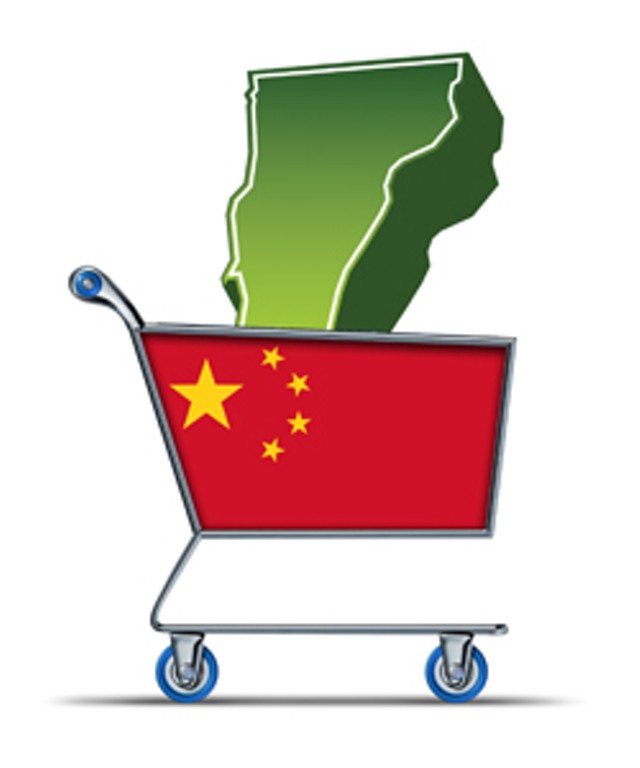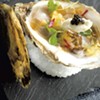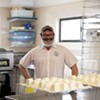Published December 11, 2013 at 6:17 a.m.
On a recent November afternoon, Vermont Secretary of Agriculture Chuck Ross and a small clutch of other ag officials and producers stepped out of the Hong Kong airport. They’d been on a plane for 15 hours, and a teeming, dynamic city awaited them.
But forget sightseeing. What lay ahead were nine days packed with visits in Hong Kong (population seven million), Guangzhou (eight million), Chengdu (13 million) and Shanghai (25 million). Along the way, the Vermonters were scheduled to meet with Chinese importers, distributors and marketers — sometimes in their offices, often in hotel rooms. “It was almost like speed dating,” sums up Alex Weiss, the Brooklyn-based director of sales for Hardwick’s Caledonia Spirits, who traveled with the group.
The mission was to make inroads for Vermont food and drink in the booming Chinese market, where wages are growing by about 10 percent each year. (The average urban Chinese worker made 24,565 yuan last year, or about $4045, according to numerous media outlets.) However, each Vermonter on the trip — whether marketing cheese, maple syrup or artisanal spirits — met with unfamiliar challenges. Those included China’s traditional eating habits; the cultural requisite of nurturing business relationships before making a sale; and geographical issues — as in, where the heck is Vermont?
“Some people definitely hadn’t heard of Vermont, though they had some sense of ‘Indian summer’ and images of foliage,” says Chelsea Bardot Lewis, the state’s senior agricultural development coordinator, who was on the trip. “How do we tell a story in a market where Vermont doesn’t have meaning?”
China is already Vermont’s third-largest international trading partner (Canada is the largest; Mexico second); state agricultural businesses sold nearly $1.3 million worth of goods to the Chinese in 2012, out of $166 million to markets worldwide. Yet Ross, Bardot Lewis and others thought the Chinese market merited a visit.
“Part of the reason to go to a place like China is to find markets that will generate demand for Vermont products to support this working landscape,” Ross says. “We’re an export state and always have been when it comes to agricultural products. With only 626,000 people, we can’t support the working landscape with just ourselves.”
The group was stewarded by Ross — who was recently elected president of the National Association of State Departments of Agriculture — and Tim Hamilton, executive director of Food Export USA-Northeast, a nonprofit that promotes exports abroad, and of which Vermont is a member. Hamilton says his group has helped make inroads in the Asian market for lobster and wild blueberries; he calls himself “bullish” about promoting Vermont food products next.
Both Hamilton and Ross see the region’s relative unfamiliarity with Vermont as an opportunity, especially as the Chinese become more focused on healthy food as a result of ongoing pollution and food scares, such as the 2008 milk and infant-formula scandal.
That tragedy was an unexpected boon to American dairy producers, who now ship 15 to 17 percent of their milk abroad. Among them is Agri-Mark, which has facilities in Cabot and Middlebury and exports millions of dollars’ worth of whey protein. But the road ahead is longer for specialty products such as cheese. In Hong Kong, the Vermonters noticed that high-end food markets and cheese shops offered “hardly any American cheeses,” says Bardot Lewis. She saw Philadelphia Cream Cheese, Tillamook cheddar and products from Organic Valley — but no Cabot cheddar or Spring Brook Farm Reading.
“When you go into the high-end retail stores, you see products marked by their country’s flags. You can identify Europe, New Zealand, Canada,” says Ross. “Certainly, products from afar can be marketed successfully. If the Canadians can do it and the Europeans can do it and the New Zealanders can do it, so can we.”
Jeremy Stephenson, co-owner of Spring Brook Farm, represented four other Vermont cheese companies on the trip. He hadn’t thought much about international exports until he set foot for the first time in China. “[The trip] forced me to look at different ways of selling our cheese through new channels,” Stephenson says. His company makes nearly 180,000 pounds of cheese a year and supports three other dairy farms in Reading, but it sells only 13 percent of the cheese in Vermont. “You have to sort of step out of what you know, and your routine, in terms of sales and marketing,” he says. “It broadened my overall view of sales.”
For years, the prevailing maxim has been that the Chinese are averse to dairy products, even lactose intolerant. Yet Stephenson saw those myths dissipate at a Shanghai food and hospitality trade show where he set out platters of his raclette-style cheese, Reading, as well as Cabot Aged Cheddar, chèvre from Vermont Creamery, and Bayley Hazen Blue and Cabot Clothbound Cheddar from the Cellars at Jasper Hill. “Everybody in the booth thought our cheese was a magnet,” he says. The samples were snapped up eagerly.
Even if most Chinese have little knowledge of American cheese, there’s another built-in market in the country, Stephenson notes: expats. “There’s a lot of Europeans, Americans and Australians living on the Pacific Rim, especially in the major cities,” he says.
Maple has a slightly larger presence in the Chinese market, but that sector is still dominated by Canadians — and that’s something Arnold Coombs thinks a lot about. A seventh-generation sugar maker and owner of Brattleboro’s Coombs Family Farms, he’s been marketing his products abroad for 20 years and currently sells in 33 countries. Coombs, who was part of the Vermont ag delegation, recalls being surprised to find one of his maple products for sale in a Chinese store; a distributor had shipped it there without his knowledge. “Some people know about it; some people don’t. It’s still a raw market,” he says.
Coombs took part in meetings with Chinese importers and distributors that had been set up by the USDA. He says “some meetings were on target, and some weren’t even close,” and that exporting a low-margin commodity such as maple syrup “can be full of headaches.” Still, he thinks the Asian market is important to pursue. With maple production growing faster than current demand, Coombs says, “we need to keep developing our marketing.”
How do you sell a food product that isn’t used in Chinese cuisine? “A lot of the Chinese people we met didn’t express a desire for other cuisines,” acknowledges Bardot Lewis, who found herself enraptured by fiery Szechuan dishes. She suggests that Vermont could introduce maple as an ingredient in glazes, sauces, baked goods and ice cream, perhaps via chefs. “Everyone loved tasting maple, but they were trying to figure out what the usage might be,” she says.
Caledonia Spirits’ Weiss, who once lived in southern China as a Fulbright scholar in ethnobotany, is also pondering that country’s consumption patterns as he plots ways to sell Barr Hill Gin and other spirits. As a young student, Weiss was privy to Chinese drinking culture, which is vastly different from that of the West. “The Chinese … are partial to brown spirits and are crazy about French wine — but are less prone to buy bottles of premium liquor to drink at home,” he says. “Retail sales of booze are infinitesimal compared to on-premises consumption.”
While the Vermont group was in Asia, a nice serendipity occurred: Barr Hill Gin won a gold medal at the International Wine and Spirit Competition in Hong Kong, which Ross accepted on the company’s behalf. However, that doesn’t assure smooth sailing for the product in China. The mainland has much more complicated sales channels, fees and tariffs than does Hong Kong, where Barr Hill Gin is already sold.
“An important piece of criticism we received is that our product will be really expensive in China,” says Weiss, who notes that a 47 percent tariff is just one element of the costs involved in exporting spirits to that country. “I think that can be an asset, though,” he says. “We’re told we should target luxury clientele. People in China want what they can’t get. You have to create an image of scarcity and exclusivity.”
Weiss is neither surprised nor disappointed that, like others on the trip, he didn’t make a single sale; he didn’t expect to. “Business in China takes a long time. It takes guanxi,” he says, referring to the Chinese concept of business connections nurtured slowly — and sometimes aided by frequent gift exchanges. (He handed out gin and raw honey.) “The trip was a huge success, not necessarily in terms of any of us getting direct sales,” Weiss says, “but in terms of gaining a much broader understanding of the market and how it works.” He met with 20 people, he recalls, but considers only two or three “potential partners.”
“As Arnold [Coombs] said, being in China was like being outside this big mansion: You can tell there’s a party going on inside, and we’re just rattling the windows,” notes Bardot Lewis.
Like Weiss, Ross thinks the trip laid important groundwork for future sales of local agricultural goods. But he was glad to get home. In China, he found the perpetual traffic “both impressive and entertaining,” but adds, “The air is so thick you almost need a spoon to breathe it. You could taste the air. It really made me very glad to be a Vermonter.”
The original print version of this article was called "Halfway to China"
More By This Author
Speaking of Food
-

Q&A: Howard Fisher Delivers Meals on Wheels With a Side of Good Cheer
Dec 20, 2023 -

Video: Howard Fisher Delivers Meals on Wheels
Dec 14, 2023 -

Q&A: Alexis Dexter Rescued 57 Shelter Cats During the July Flood
Sep 13, 2023 -

Video: Two Months After the Flood, Alexis Dexter Rebuilds Kitty Korner Café in Barre and Continues to Rescue Cats
Sep 7, 2023 -

Video: Saying Goodbye to Burlington’s Penny Cluse Café
Nov 17, 2022 - More »
Comments
Comments are closed.
From 2014-2020, Seven Days allowed readers to comment on all stories posted on our website. While we've appreciated the suggestions and insights, right now Seven Days is prioritizing our core mission — producing high-quality, responsible local journalism — over moderating online debates between readers.
To criticize, correct or praise our reporting, please send us a letter to the editor or send us a tip. We’ll check it out and report the results.
Online comments may return when we have better tech tools for managing them. Thanks for reading.















































